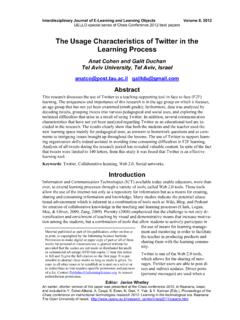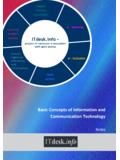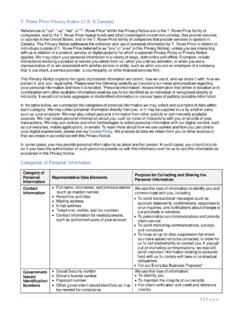Transcription of The impact of using smartphones on the academic ... - ed
1 Knowledge Management & E-Learning, , Sep 2018 The impact of using smartphones on the academic performance of undergraduate students Ifeanyi Peter Ifeanyi Joshua Ebere Chukwuere North-West University, South Africa Knowledge Management & E-Learning: An International Journal (KM&EL) ISSN 2073-7904 Recommended citation: Ifeanyi, I. P., & Chukwuere, J. E. (2018). The impact of using smartphones on the academic performance of undergraduate students. Knowledge Management & E-Learning, 10(3), 290 308. Knowledge Management & E-Learning, 10(3), 290 308 The impact of using smartphones on the academic performance of undergraduate students Ifeanyi Peter Ifeanyi Faculty of Economic and Management Sciences North-West University, South Africa E-mail: Joshua Ebere Chukwuere* Faculty of Economic and Management Sciences North-West University, South Africa E-mail: *Corresponding author Abstract: This study investigated the impact of using smartphones on the academic performance of undergraduate students at the North-West University, South Africa.
2 To determine the impact , this study deployed the quantitative research approach to collect data from 375 undergraduate students using questionnaires. It was found that most undergraduate students are using their smartphones to engage with fellow students and lecturers. It was also found that using smartphones distracts students from their studies in certain aspects. The results also showed the impact of using smartphones on students academic capabilities and progression. Keywords: academic performance; smartphones ; Undergraduate students; Learning; South Africa Biographical notes: Ifeanyi Peter Ifeanyi is a MCom Computer Science and Information Systems student in the Department of Information Systems, Faculty of Economic and Management Sciences, North-West University (NWU), South Africa.
3 His research areas include smartphones , social media and many more. Dr. Joshua Ebere Chukwuere (PhD) is a Senior Lecturer at the Department of Information Systems, Faculty of Economic and Management Sciences, North-West University (NWU), South Africa. His research interests comprise culturetech, mobile banking, e-health, online banking, Internet of Things (IoT), smart city, technology acceptance, culture-oriented technology, e-learning, e-health, social media and others. 1. Introduction smartphones are equipped with multimedia phone features, which include camera function, sound recording function, video function and many others. These features assist students to drive their learning process and dreams effectively. According to Kibona and Knowledge Management & E-Learning, 10(3), 290 308 291 Mgaya (2015), most smartphone- and recreational applications are addictive to both the higher level and lower level students in Tanzania, which, in turn, affects their academic performance.
4 The applications mentioned included WhatsApp, Twitter and Facebook. Furthermore, some learning systems have emerged over the years and involve ubiquitous learning (u-learning), which is being powered by smartphone capabilities in the learning environment. According to Jung (2014), ubiquitous learning (u-learning) combines the characteristics of electronic learning (e-learning) and mobile learning (m-learning), in driving forward different forms of learning through the internet connection process in the 21st century. The mentioned forms of learning are all available on smartphones (e-learning and m-learning). Jung (2014) further states that u-learning is used to provide students with the right learning materials, depending on their situation. In this study, u-learning initiatives are supported by smartphones , which are used by the undergraduate students of the North-West University (NWU) in South Africa to access learning materials anywhere, anytime.
5 The NWU s Mahikeng Campus is located in the heart of Mahikeng, the capital city of the North West Province, South Africa. At the Mahikeng Campus, a free wireless network is provided to students in some locations around the Campus. The Campus can be said to consist of students from middle- to lower-income families (Chukwuere, Mbukanma, & Enwereji, 2017) or disadvantaged societies, and using smartphones is becoming a norm. Students who have smartphones connect easily to the wireless networks and gain limitless access to internet connections that are aimed at advancing students learning experience and performance. Furthermore, the deployment of these internet (Wi-Fi) connections is aimed at increasing access to learning contents across the Campus and beyond. One of the thriving platforms to increase access to learning contents is e-Fundi.
6 It is a course or learning management system used as a mechanism for learning engagement and communication and learning content delivery between the students and lecturers. e-Fundi helps the students to obtain their study materials, such as their lecture slides, to engage in online forums, to submit assignments, to write tests, quizzes and examinations, to communicate with lecturers and other students, and many more. It also possesses qualities of u-learning in the sense that, regardless of your geographical location within the nation, it can provide the student with the right learning materials for their academic work through smartphones . This means that e-Fundi is mobile-friendly, driving e-learning initiatives and, in doing so, increases access to learning contents for students on- or off-campus.
7 Consequently, according to Joshua, Nehemiah, and Ernest (2015), e-learning is a borderless learning experience to increase tutors and (undergraduate) students interaction as well as delivering effective teaching and learning contents across different platforms, such as smartphones and many more. E-learning platform promotes self-directed and progressive learning processes and access to high-quality learning contents (Weichhart, Stary, & Appel, 2018; Day & Erturk, 2017). Although, according to Guspatni (2018), sometimes the system can be difficult to navigate and use. To this study, the adoption of smartphone in classrooms promotes access to e-learning materials and opportunities. The high levels of addiction to smartphones prove that it affects students academic performance (Kibona & Mgaya, 2015). This addiction causes some concerns as to whether the use of smartphones hampers or elevates the performance of students in general.
8 Ezemenaka (2013) writes that the invention of mobile phone technology thrived with the quest for new knowledge changes and the desire among university students, and most of them are affected, including undergraduate students. This impact contributes to the students academic performance both negatively and positively. With due consideration of the effect of smartphones on the lives of university students, this study 292 I. P. Ifeanyi & J. E. Chukwuere (2018) aimed at investigating the impacts (positive and negative) of smartphones on the academic performance of undergraduate students. Furthermore, the study also investigated the impact of smartphones on undergraduate students academic capabilities. Furthermore, to address the research objectives and tackling the problem statement, the following research questions were explored: What are the positive impacts of smartphone usage on the academic performance of undergraduate students?
9 What are the negative effects of smartphone usage on the academic performance of undergraduate students? What are the effects of smartphones on undergraduate students academic capabilities? 2. Literature review Many researchers have, through recent years, pointed out the advantages and disadvantages of students using smartphones . It goes both ways, as the use of smartphones affects the students lives not only academically, but also their personal lives. However, smartphone usage among undergraduate students of the NWU is yet unknown. Nevertheless, the use of smartphones has both positive and negative impacts on the students who use them. Role of smartphones in academic learning The role of smartphone and mobile technologies in education must not be ignored (Tikoria & Agariya, 2017).
10 academic learning is now innovative as a result of smartphone and other media in promoting and advancing 21st century needed skills and knowledge (Tulenko & Bailey, 2013; Emerson & Berge, 2018). Students have experiences of digital surroundings in a tactile and personal manner, which is brought about by some mobile devices, including tablets and smartphones (Cano, 2012). Mokoena (2012) argues that the use of smartphones by students improves collaborative learning through its connection to the internet. This statement implies that the use of smartphones drives students to be more engaged in learner-centred participation learning. This is a vivid indication on numerous supports that smartphones have brought to the students; it advances their understanding by increasing academic performance, social media participation and information sharing; it helps their social skills by giving them opportunities to seek academic assistance and support, and many more (Mokoena, 2012).













